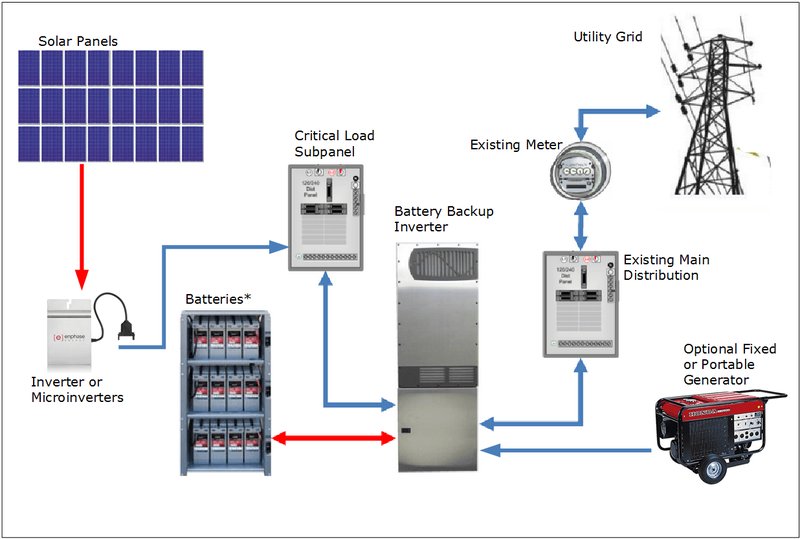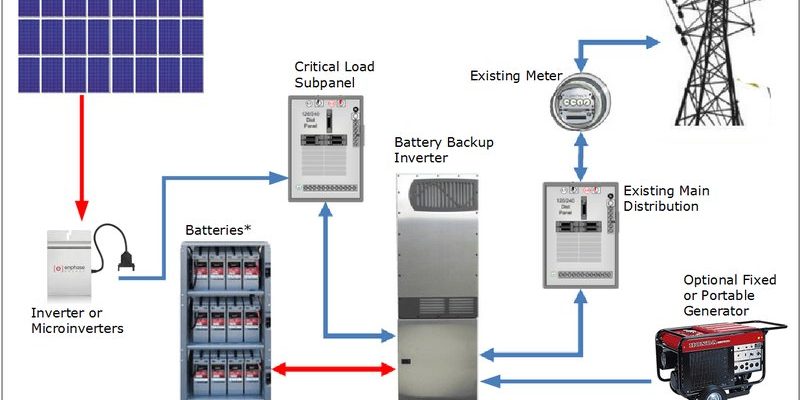
Many folks are curious about whether investing in a solar backup system is worth it, especially in a location where weather patterns can change unexpectedly. So, let’s dive into what solar backup systems are, how they operate, and the specific benefits and challenges you might face in your area. Grab a cup of coffee, and let’s get into it.
A solar backup system combines solar panels with battery storage to provide energy even when the grid goes down. Think of it as a safety net for your home. When the sun shines, your solar panels generate electricity, which typically powers your home during the day and charges the batteries for later use. If a storm hits and knocks out power, your batteries can kick in and keep crucial appliances running—like lights, refrigerators, and even your Wi-Fi.
These systems are especially useful for those who may experience frequent power outages. With a solar backup, you won’t have to worry about prepping for a blackout. Instead, you can relax knowing that your essential devices will keep functioning. You might even get to binge-watch that series you love without interruptions!
Living in Little Rock, you can enjoy several benefits when opting for a solar backup system. Here’s a breakdown of some key advantages:
- Energy Independence: Relying on the sun for power means you’re less dependent on the grid. This independence can be a big deal during summer storms or winter snow. When everyone else is scrambling for flashlights, you’ll have the lights on.
- Cost Savings: Although the initial setup might seem steep, solar energy can save you money on your electric bill in the long run. Plus, any excess energy generated during sunny days can sometimes be sold back to the grid, a win-win!
- Environmental Impact: By using renewable energy, you’re reducing your carbon footprint. That’s a pretty fantastic feeling! You’re doing your part to help the planet when you go solar.
While the benefits sound enticing, it’s essential also to consider some challenges.
Like any good thing, there are a few bumps in the road when it comes to solar backup systems. Here are some challenges to keep in mind:
- Initial Costs: Solar panels and batteries can require a hefty upfront investment. Depending on the size of your system and how much energy you need, this could be a significant amount. However, financing options are often available to help ease this burden.
- Space Requirements: You’ll need adequate space for installation, both for the solar panels on your roof and the batteries somewhere in your home. If you have limited space, this could be a deal-breaker.
- Weather Dependency: Although solar panels generate energy on cloudy days, they’re most efficient in direct sunlight. So, if you experience long periods of overcast skies, you may need to consider backup fossil fuels or the grid.
You might be wondering how a solar backup system functions on a day-to-day basis. Here’s a simple breakdown:
1. Sunlight to Electricity: Solar panels convert sunlight into electricity. This process occurs through a phenomenon called the photovoltaic effect, where sunlight knocks electrons loose from atoms in the solar cells, creating electricity.
2. Storing Energy: The generated electricity can either be used immediately or stored in batteries for later use. Think of these batteries as your home’s energy bank. The more you save today, the more you can use during outages.
3. Power During Outages: When the grid fails, your home’s system automatically switches to use the stored energy from the batteries, keeping everything running smoothly while you enjoy the comforts of home.
This system typically syncs seamlessly with your home’s existing electrical system, so you won’t even notice the shift unless you’re paying close attention.
You might be considering solar backup systems against traditional gas generators. Let’s look at how these two stack up.
- Fuel Source: Solar power relies on the sun, which is free and abundant. In contrast, gas generators need fuel, which can add up in costs and require regular trips to the gas station.
- Environmental Impact: Solar is eco-friendly, while gas generators emit carbon pollution. If you’re environmentally conscious, this is a significant factor to consider.
- Noise Levels: Most solar backup systems operate quietly, while gas generators can be quite noisy. If you’re using it in a residential area, you might want a quieter option, especially at night.
In many cases, solar backup systems can provide a more sustainable and reliable option for homeowners than traditional generators.
Another consideration for residents in 72201 is the local incentives available for solar energy. The state of Arkansas has various programs designed to support solar energy installation, including tax credits, rebates, and net metering policies.
In fact, federal tax incentives allow homeowners to deduct a percentage of their solar installation costs from their federal taxes. This can significantly reduce the overall cost of your solar backup system, making it a more appealing prospect.
Additionally, local utility companies may offer specific rates for solar energy, further enhancing the financial viability of going solar. Don’t overlook these incentives when making your decision!
Ultimately, whether solar backup is a good option for you in 72201 depends on several factors:
– Location: The amount of sunlight your home receives on average will significantly impact your system’s efficiency.
– Budget: Consider your financial situation and how much you’re willing to invest upfront.
– Energy Needs: Evaluate your household energy consumption. If you often find yourself needing power during outages, a solar backup might truly shine for you.
Taking these aspects into account will help you determine if solar backup is the right fit for your home.
So, there you have it! Solar backup systems provide a unique way to harness the power of the sun and offer a reliable energy source in your home, especially in Little Rock’s changing weather. While it may seem overwhelming at first, consider speaking with local solar experts to explore your options further. They can provide insights tailored to your specific situation, ensuring that you make an informed decision for your energy future.
